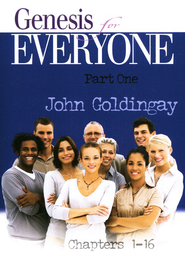John Goldingay: Genesis for Everyone
 John Goldingay, Genesis for Everyone Part One: Chapters 1−16 (Louisville: Westminster John Knox Press, 2010), 197 pages.
John Goldingay, Genesis for Everyone Part One: Chapters 1−16 (Louisville: Westminster John Knox Press, 2010), 197 pages.
John Goldingay, Genesis for Everyone Part Two: Chapters 17−50 (Louisville: Westminster John Knox Press, 2010), 186 pages.
Genesis for Everyone lives up to its name. This two volume contemporary commentary of the book of Genesis is a refreshing and straightforward read of the creation account and the Genesis stories. John Goldingay is a prominent Old Testament scholar and theologian whose wealth of knowledge and insight contributes greatly to the understanding of these narratives. He writes in such a way as to inspire readers to engage in the spiritual and theological concepts of the book of Genesis in a modern context. Goldingay has written extensively on Genesis and Old Testament theology. However, this two volume commentary is worlds apart from his trilogy, Old Testament Theology that represents his magnum opus. Both works do give readers an appreciation for an Old Testament theologian whose rigorous readings of the final form of the text produce significant insights for both the church and the academy. Goldingay has benefited from the resurgence of Brevard Child’s canonical approach and from the possibilities of contextualized interpretation influenced by postmodern epistemologies. His long and prestigious career is marked by a keen methodological reflection and creative insights of the text with a commitment to the academy, as well as the contemporary church.
This two volume work is specifically targeted for the lay church audience. This commentary is not concerned with textual or critical methodological approaches. The author’s purpose is to highlight the importance of what he prefers to name “The First Testament” and the depth of understanding God’s ways through these Scriptures. Its aim is to provide the historical and theological implications to assist lay readers with the interpretative process for the book of Genesis. Goldingay’s respect for the Jewish sources is apparent within his interpretations of various texts; although, not explicitly cited. However, Goldingay treats the Hebrew canon from a Christian canonical context and incorporates the New Testament into his reading. The volumes are user friendly with key historical and theological terms in bold corresponding to a glossary at the end of each volume. Goldingay divides the volumes by chapters instead of by content for a practical split.
A companion guide for the purpose of explaining the stories.
Category: Biblical Studies, Summer 2011


